Regardless of the genius of an athlete, retirement is a reality that all sportspersons have to contend with. However, the allure of sport and fame are such that many athletes cannot help but succumb to the call of the arena, even after they have bid farewell to the sport. Many an athlete has defied age and time, coming back from retirement, achieving new conquests in his or her second innings. Sport has seen many a fairytale comeback. At the same time, sport has also been witness to comebacks that have been disastrous. Let us take a look at ten such failed and forgettable comebacks in sport.
#1 George Headley (Cricket)
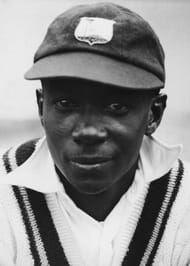
‘The Black Bradman’, George Headley was the lynchpin of the West Indies batting line-up for nearly two decades. Although he played a meagre 22 Tests in a career that was cut short by the supervention of the Second World War, Headley scored 2190 runs with ten hundreds to boot and ending his career with an average of 60.83 against his name, second only to Don Bradman’s at the time of his retirement.
His post-war career, however, was wracked by injury and Headley failed to touch the heights that had led to comparisons with Bradman. Although he went on to become West Indies’s first black Captain in 1948, in a Test played against England at Barbados, his prowess as a batsman was clearly on the wane.
And although he continued playing first-class cricket, his Test career seemed over following a tour of the sub-continent, in which his performance had been largely unimpressive.
However, he returned to Test cricket in 1954 when West Indies toured England. In what was his last Test, he scored just 16 and one in the two innings. He subsequently retired from all forms of senior cricket in 1955. He remains the oldest player to have played a Test for West Indies.
#2 Bjorn Borg (Tennis)
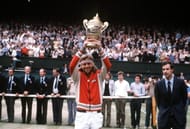
Tennis in the mid and late 1970s was synonymous with one name: Bjorn Borg. The 11-time Grand Slam Champion, who apart from his astounding feats on the Court, which included winning the Wimbledon five times in a row, was also an iconic figure off it, featuring in numerous advertisements and becoming the first Tennis player to earn more than a million dollars.
In January 1983, he sent the tennis world into a shock by announcing his retirement although he was aged just 26.
When he came out of retirement in 1991, aged 35, he refashioned himself, letting his hair grow and insisted on using wooden racquets (although he went on use graphic racquets later on). His comeback was nothing short of a catastrophe, as he failed to win even a single match and he bid adieu to the game, this time for good, in 1993.
#3 Michael Schumacher (Formula One)
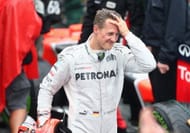
From 2000 to 2004, Formula One meant Ferrari and Michael Schumacher. The German ace won the Formula One championship a stunning five times on the trot, the only driver till date to achieve the feat. In all, Schumacer won the championship a record seven times before announcing his first retirement in 2007.
His return to Formula One was, on the other hand, a forgettable affair. In 2010, which was the first season in his comeback, he finished without a podium finish for the first time since his debut year in 1991. Across three seasons with Mercdes (2010-12), he had just the one podium finish before he bade farewell to the sport for good.
#4 Ian Thorpe (Swimming)
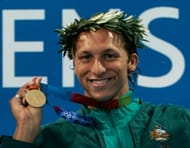
Five-time Olympic Gold medallist Ian Thorpe is widely recognised as one of the best swimmers of the 21st century. A specialist in freestyle, even Michael Phelps, who competed against him in the 2004 Athens Olympics as a 17-year old, couldn’t get the better of the Australian in the freestyle events.
In 2006, after his plans to compete in the 2007 World Championships were scuttled by an illness, he announced his retirement.
Returning in 2011, Thorpe said that he would try to qualify for the London Olympics in 2012. However, changed rules and his recurring illness prevented Thorpe from progressing beyond the semi-finals at the Australian Olympic trials.
#5 Muhammad Ali (Boxing)
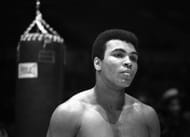
‘The Greatest’, Muhammad Ali remains the only three-time Heavyweight Champion in the world. Ali, who was as fiery outside the ring as he was within, is remembered for his involvement in many a historic match, ‘The Rumble in the Jungle’, where he fought and beat George Foreman, being counted amongst the most memorable matches in the sport.
Following his win against Leon Spinks, which made him the first boxer to win three Heavyweight championships, Ali announced his retirement in 1979, probably one of the shortest hiatuses ever. Ali was asked to come out of his retirement and fight Larry in 1980.
A spent Ali even had to undergo a physical examination before the fight could take place and the fight against Holmes turned out to be punishing for ‘The Champ’. Despite his poor performance against Holmes, Ali stubbornly refused to retire and in 1980, boxing against Trevor Berbick at Nassau, Ali lost a ten-round decision which effectively brought the curtains down on his career.
#6 Michael Jordan (Basketball)
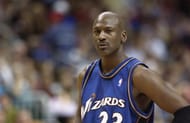
Considered the greatest basketball player of all time, Michael Jordan, after having guided Chicago Bulls to three straight NBA titles in the years 1995-98, announced his retirement for a second time.
He returned to the game a third time, playing for a struggling Washington Wizards this time around. In the two seasons that he played for Washington, he averaged over 20 points per game and showed that he was as good as anybody on the circuit despite his age. However, his achievements proved inadequate to take the Wizards to the play-offs and his second comeback is largely perceived as a failure.
#7 Javed Miandad (Cricket)
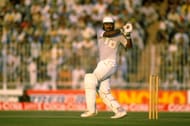
A prolific run-scorer with an insatiable appetite for runs, Javed Miandad remains Pakistan’s greatest batsman till date. While his teammates Zaheer Abbas and Wasim Raja were renowned for their flair and elegance, Miandad, although unlikely to be described using superlatives, was a tenacious fighter with an uncanny knack for piercing gaps and picking up singles.
Until Sachin Tendulkar emulated him in 2011, Miandad had been the only player to have played in six World Cups, having appeared in the first six editions of the event. He enjoyed success in both Tests and ODIs, scoring over 8000 runs in the former and more than 7000 in the latter.
After playing a key role in guiding Pakistan to its World Cup triumph in 1992, Miandad seemed set for retirement in 1993. While he did not play any more Tests, he returned in 1996 to help Pakistan mount a defence of its World Cup title. Bur, he failed to rekindle the magic that had once seen him being counted alongside Zaheer Abbas and David Gower was noticeably absent. He managed a motley 104 runs in five games.
#8 Goran Ivanisevic (Tennis)
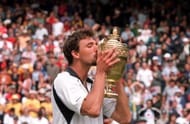
Thrice Goran Ivanisevic had made it to the final of ‘The Championships’ at Wimbledon and had come undone in all three of them. Andre Agassi in 1992 and Pete Sampras in 1994 and 98, had gotten the better of the big-serving Croat.
But, determined to win the most coveted title in Tennis, Ivanisevic, competing in the 2001 event on a wild card, overcame astronomic odds to triumph and engrave his name indelibly on the pages of history.
After a shoulder injury forced him into semi-retirement in 2002, he returned to tennis two years later at the theatre of his dreams, Wimbledon. However, his Wimbledon campaign was cut short by Lleyton Hewitt, who brought down Ivanisevic in straight sets. Following the defeat, Ivanisevic announced his retirement but lead the Croatian team to a Davis Cup win as its non-playing Captain.
#9 Mark Spitz (Swimming)
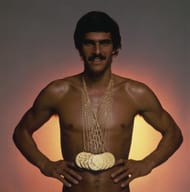
Until the advent of a certain Michael Phelps, Mark Spitz was largely considered the greatest American swimmer ever. Even before he created history at the Munich Olympics where he won a jaw-dropping seven gold medals, he had already engraved his name in history by dint of having won two Gold medals at the 1968 Olympics at Mexico City.
After filmmaker Bud Greenspan bet a million dollars challenging Spitz to qualify for the 1992 Barcelona Olympics, the American swimmer returned to the pool aged 41. And although his speeds were close to the records that he had set in 1972, Spitz turned out two seconds slower than the qualifying limit, thereby putting paid to any hopes Spitz may have had of winning another Olympic medal.
#10 Magic Johnson (Basketball)
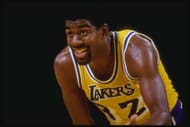
Magic Johnson was a Los Angeles Lakers point guard who won the MVP award on three occasions and played a pivotal role in guiding his team to three NBA wins in the 1980s.
He announced his retirement for the first time in 1991 after he contracted HIV before making a dramatic and unexpected comeback in the 1992 season. His performance in the All-star game won him rave reviews but protests from fellow players forced to hang up his boots for a second time.
However, aged 36, he returned to the court for a third time in 1996 and despite having a good season on a personal level (he averaged 16.5 points per game), he failed to take his team, Los Angeles Lakers to the playoffs.
